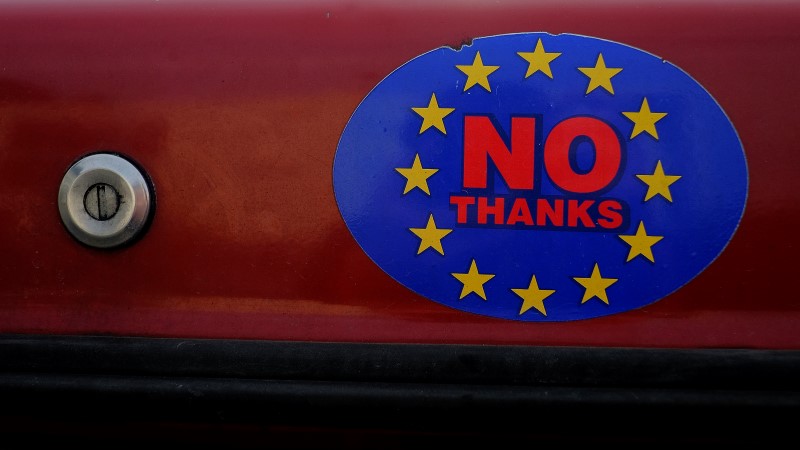By Freya Berry and Kylie MacLellan
LONDON (Reuters) - British support for leaving the European Union has surged, according to two telephone opinion surveys published a week before the June 23 referendum, with one pollster putting support for "Leave" at a more than three-year high.
The Ipsos MORI poll of 1,257 adults across Britain from June 11-14 showed 51 percent of all voters wanted to leave the bloc and 49 percent wanted to stay.
But, when filtered for those likely and registered to vote, the poll showed 53 percent would vote to leave and 47 to remain - the highest support for the 'Leave' campaign recorded by the pollster in more than three years.
A separate phone poll by Survation showed 'Leave' ahead on 45 percent, up 7 percentage points from its last poll on May 25 and ahead for the first time since the poll began in February. Support for "Remain" dipped 2 percentage points to 42 percent with 13 percent undecided. The poll surveyed 1,104 people.
Of the seven most recently published polls this week, six showed the Leave campaign in the lead, a trend pollsters said showed that the opponents of Britain's 43-year-old EU membership had dominated the campaign in recent weeks.
"With a week to go, Leave have outgunned Remain with a series of arguments on immigration and money that are often believed despite being flatly denied by the other side," Ipsos MORI Chief Executive Ben Page told Reuters.
"Polls don't predict but pollsters sometimes do: personally I think that as in Scotland the status quo may triumph at the last minute. But it looks very close," Page said.
Britain's sterling currency fell to it lowest of the day of $1.4100, down 0.7 percent on the day, just after the Survation poll was published. The probability of an In vote fell 5 percentage points to 60 percent, according to betting odds supplied by Betfair.
The polling also marks a major turnaround since a May survey by Ipsos MORI, which at that time found 37 percent wanted to leave against 55 percent who wanted to stay.
Its latest June figures were also filtered by those actually registered to vote, and weighted according to a voter's educational background, Ipsos MORI said.
A vote to take Britain out of the world's biggest trade bloc would spook investors by undermining post-World War Two attempts at European integration and placing a question mark over the future of the United Kingdom and its $2.9 trillion economy.
Such is the concern over Brexit that the U.S. Federal Reserve cited it as a reason it delayed an interest rate rise this week. Sterling has also tumbled, British government bond yields have been pushed to record lows and billions of dollars have been wiped off global stocks.
IMMIGRATION TRUMPS ECONOMY
The free movement of EU citizens into Britain, which Out campaigners have cited as the most serious problem with EU membership, has eclipsed concerns about the negative economic impact from Brexit, which In campaigners regard as their top argument, according to the poll.
"On immigration there is a problem, and there is a solution (presented by the Leave camp)," said John Curtice, professor of politics at the University of Strathclyde. "On the economy, there is a warning but no optimism. And that is potentially a strategic weakness."
The poll underscored the mistrust of politicians on both sides of the campaign but especially strong scepticism toward the assertions made by Cameron and finance minister George Osborne, the Evening Standard said.
Osborne, who has warned of an emergency austerity budget if Britain votes to leave, was due to speak about the risks of quitting the 28-nation EU in a speech on Thursday night.
The Bank of England escalated its warnings about the fallout from a Brexit, saying it could harm the global economy and that sterling looked increasingly likely to fall further after an "Out" decision.
But just 17 percent of people believed Osborne's statement that households would lose 4,300 pounds ($6,079) and be permanently poorer after a Brexit. Some 70 percent consider it a falsehood, according to the Evening Standard.
Almost half believe leading Out campaigner Boris Johnson is telling the truth when he says that Britain sends 350 million pounds a week to the EU - even though it has been criticized as misleading by pro-Remain lawmakers and by independent experts.
Page said the Out campaign had made an end to unlimited EU immigration its main plank over the past month, eclipsing the In campaign's warnings about the economic consequences of a Brexit.
"Immigration has become the argument, with the economy, Remain's strongest card, becoming less relevant in the last month. Twenty percent of voters may change their minds, giving hope to both sides, although often undecided (traditionally) don't bother to vote," he said.
Pro-Remain campaigners, including ex-prime ministers Tony Blair and John Major, have warned that an exit may also trigger the break-up of the United Kingdom by prompting another Scottish independence vote if England effectively pulled Scotland out of the EU. Scots are seen as strongly pro-EU.
Members of the Out campaign say such warnings are overblown and that Britain would prosper if it broke free from what they say is a doomed German-dominated EU that punches way below its weight beside rivals such as Russian President Vladimir Putin.

Despite a series of forecasts that the euro zone would collapse during the Greek debt crisis, it has endured.